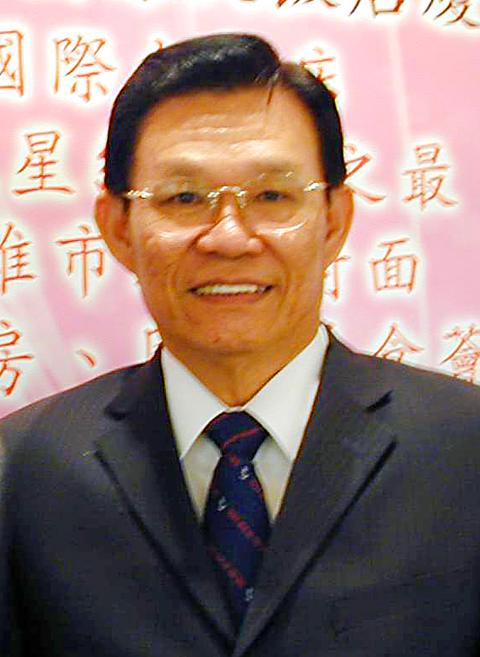Members of the public and lawmakers were outraged upon learning that retired vice admiral Ko Cheng-sheng (柯政盛), convicted of spying for China, can continue to collect his pension, estimated to be at least NT$80,000 (US$2,526) a month.
In the ruling by the Supreme Court on Monday, Ko was found guilty and handed a 14-month jail term for violating the National Security Act (國家安全法), attempting to set up a spy ring in Taiwan and passing on classified military information to China.
After the court’s decision, it was revealed that Ko is still eligible to collect a generous monthly “lifetime pension,” which is given to retired military commissioned officers based on their period of service. The former vice admiral is also eligible for the special 18 percent bank deposit interest rate which is reserved for civil servants, military personnel and public school teachers.

Photo: Taipei Times
According to government sources, based on his rank of vice admiral and factoring in the 18 percent preferential interest rate, Ko stands to collect a pension of between NT$80,000 and NT$90,000 a month from the government.
In an interview with a military official, who declined to be named, the officer expressed his outrage at the situation.
“He was a senior officer and deputy commander of the nation’s fleet. However, China bought him off with money, so he sold our military secrets to them and tried to form a spy ring to conduct espionage and gather classified information for China,” the official said.
“He is a traitor, yet he can still collect his fat monthly pension. This is just too much. How can people in our society accept this?” the official said.
Critics said that Ko received a relatively light sentence for being convicted of espionage, especially since he jeopardized national security. Some called for a judicial amendment to hand out heavier punishments, including life imprisonment.
A legal expert said that Ko was charged with contravention of the National Security Act, which carries a lesser punishment, and that a conviction does not preclude those found guilty from collecting their lifetime pension.
The expert said that Ko could only be ruled ineligible for his pension if he had been charged with “offenses against the internal and external security of the state” (內亂外患罪), found guilty of corruption, or convicted and given a life sentence or the death penalty.
In response, Ministry of National Defense spokesman Major General David Lo (羅紹和) yesterday said that in cases of individuals convicted of serious crimes, “the military supports the government in considering to amend the law and to deliberate on making changes to the lifetime pension program in order to uphold social justice.”

ENDEAVOR MANTA: The ship is programmed to automatically return to its designated home port and would self-destruct if seized by another party The Endeavor Manta, Taiwan’s first military-specification uncrewed surface vehicle (USV) tailor-made to operate in the Taiwan Strait in a bid to bolster the nation’s asymmetric combat capabilities made its first appearance at Kaohsiung’s Singda Harbor yesterday. Taking inspiration from Ukraine’s navy, which is using USVs to force Russia’s Black Sea fleet to take shelter within its own ports, CSBC Taiwan (台灣國際造船) established a research and development unit on USVs last year, CSBC chairman Huang Cheng-hung (黃正弘) said. With the exception of the satellite guidance system and the outboard motors — which were purchased from foreign companies that were not affiliated with Chinese-funded

PERMIT REVOKED: The influencer at a news conference said the National Immigration Agency was infringing on human rights and persecuting Chinese spouses Chinese influencer “Yaya in Taiwan” (亞亞在台灣) yesterday evening voluntarily left Taiwan, despite saying yesterday morning that she had “no intention” of leaving after her residence permit was revoked over her comments on Taiwan being “unified” with China by military force. The Ministry of the Interior yesterday had said that it could forcibly deport the influencer at midnight, but was considering taking a more flexible approach and beginning procedures this morning. The influencer, whose given name is Liu Zhenya (劉振亞), departed on a 8:45pm flight from Taipei International Airport (Songshan airport) to Fuzhou, China. Liu held a news conference at the airport at 7pm,

Taiwan was ranked the fourth-safest country in the world with a score of 82.9, trailing only Andorra, the United Arab Emirates and Qatar in Numbeo’s Safety Index by Country report. Taiwan’s score improved by 0.1 points compared with last year’s mid-year report, which had Taiwan fourth with a score of 82.8. However, both scores were lower than in last year’s first review, when Taiwan scored 83.3, and are a long way from when Taiwan was named the second-safest country in the world in 2021, scoring 84.8. Taiwan ranked higher than Singapore in ninth with a score of 77.4 and Japan in 10th with

GRIDLOCK: The National Fire Agency’s Special Search and Rescue team is on standby to travel to the countries to help out with the rescue effort A powerful earthquake rocked Myanmar and neighboring Thailand yesterday, killing at least three people in Bangkok and burying dozens when a high-rise building under construction collapsed. Footage shared on social media from Myanmar’s second-largest city showed widespread destruction, raising fears that many were trapped under the rubble or killed. The magnitude 7.7 earthquake, with an epicenter near Mandalay in Myanmar, struck at midday and was followed by a strong magnitude 6.4 aftershock. The extent of death, injury and destruction — especially in Myanmar, which is embroiled in a civil war and where information is tightly controlled at the best of times —